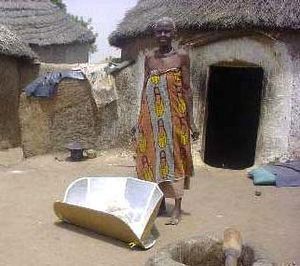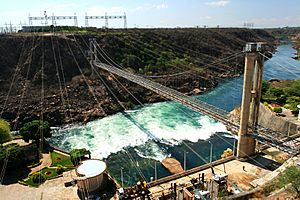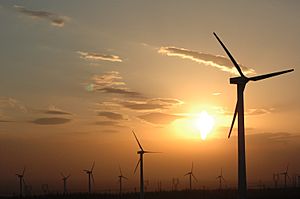Renewable energy in developing countries facts for kids

Many countries around the world, especially developing ones, have lots of natural resources for renewable energy. This includes power from the sun, wind, heat from the Earth, and biomass (energy from plants and animals). Using these clean energy sources can help countries rely less on oil and natural gas. Sometimes, investing in renewable energy can even be cheaper than building power systems that use fossil fuels.
Contents
Why Renewable Energy Matters
Renewable energy is a great fit for developing countries. Imagine trying to get electricity to small villages far away from big cities. It can be really hard and expensive to build long power lines from power plants that burn fossil fuels. But with renewable energy, you can often make electricity right where it's needed! This local power can be a much better solution.
People are becoming more interested in renewable energy for a few reasons. We are more worried about global warming and air pollution. Also, the technology for renewable energy is getting cheaper and works better than before.
Helping People Out of Poverty
Renewable energy projects in many developing countries help reduce poverty. They do this by providing the energy needed to start new businesses and create jobs. For example, a small solar panel can power a workshop. Renewable energy also helps by giving people energy for cooking, heating their homes, and lighting up their nights.
Boosting Education
Renewable energy can also make a big difference in education. It can bring electricity to schools, allowing students to use computers or study after dark. When families have solar cookers or other renewable heating, children spend less time collecting wood or other fuels. This means they have more time to be in school. Also, using cleaner fuels reduces indoor air pollution, which is much healthier for everyone, especially kids.
Improving Health
Renewable energy helps improve health too. It can provide power to keep medicines cold, which is very important in hot climates. It can also sterilize (clean) medical equipment, making sure doctors and nurses can treat patients safely. Plus, renewable energy can power systems that bring clean water and manage waste, which helps stop the spread of diseases.
Kenya's Solar Success Story
Kenya is a world leader in using solar power! They have more solar power systems per person than any other country. Every year, more than 30,000 small solar panels are sold there. Each panel can produce 12 to 30 watts of power. For about $100, a family can buy a panel and wires. This system can charge a car battery, which then powers a light or a small TV for a few hours each day. More Kenyans are choosing solar power every year than are connecting to the country's main electricity grid.
Other pages
Images for kids
 | Kyle Baker |
 | Joseph Yoakum |
 | Laura Wheeler Waring |
 | Henry Ossawa Tanner |





